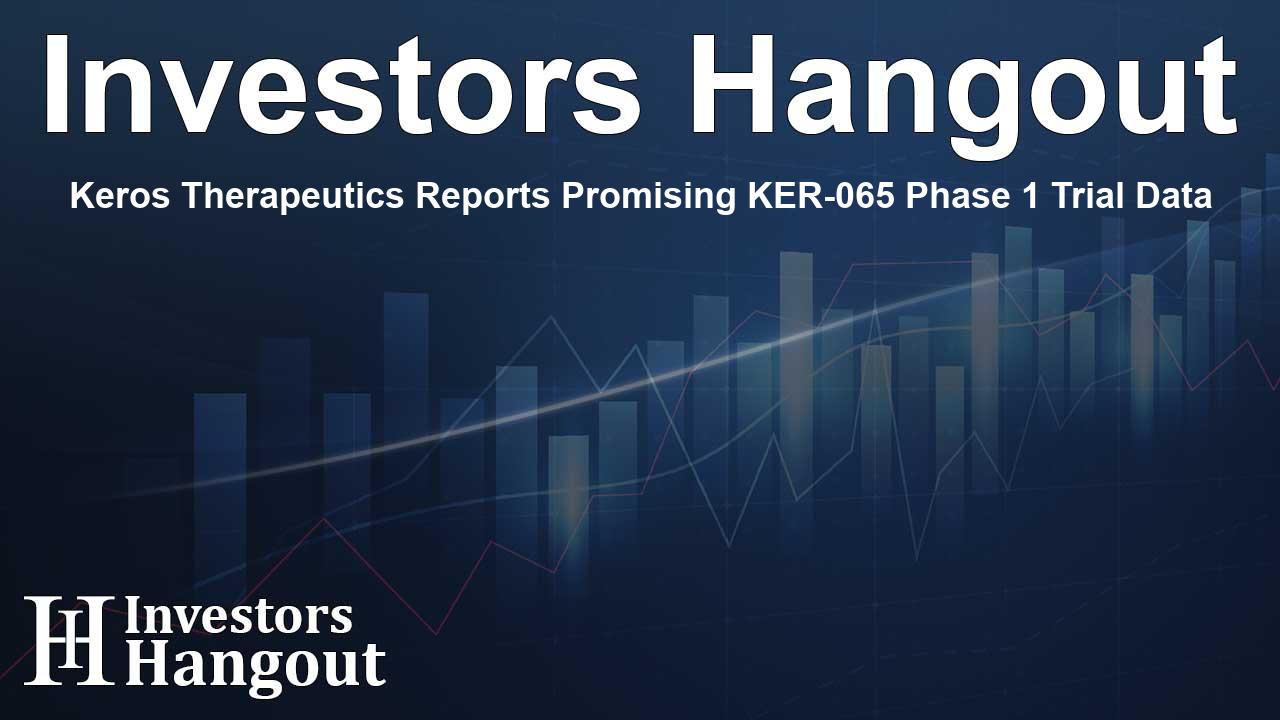Keros Therapeutics Reports Promising KER-065 Phase 1 Trial Data

Positive Topline Results from KER-065 Phase 1 Trial
Keros Therapeutics, Inc. (Nasdaq: KROS), a prominent biopharmaceutical company, has announced exciting initial topline results from its Phase 1 clinical trial of KER-065. This product is being investigated for its potential to treat Duchenne muscular dystrophy (DMD) and other neuromuscular conditions. The clinical trial’s results indicate a significant step forward in evaluating the safety and efficacy of KER-065, showing promise in helping individuals with DMD, a severe muscular disorder.
Key Findings Highlighting Efficacy and Safety
The objectives of the Phase 1 clinical trial predominantly focused on evaluating the safety, tolerability, pharmacokinetics, and pharmacodynamics of KER-065. The results reveal that KER-065 was well-tolerated among participants, with no major adverse events reported, indicating a solid safety profile. Jasbir S. Seehra, Ph.D., CEO of Keros, expressed satisfaction with these outcomes, highlighting the pressing need for new treatment options in DMD, given the limitations of existing therapies.
Among the significant findings presented from the trial was evidence supporting activin inhibition. The evidence was noted through various biomarkers linked to bone formation and fat mobilization. For example, increases in bone-specific alkaline phosphatase (BSAP) suggested enhanced bone formation, while decreases in C-Terminal Telopeptide (CTX) hinted at reduced bone resorption. Furthermore, shifts noted in body composition confirmed substantial potential in tackling the aspects of DMD.
The Role of KER-065 in Potential Treatments
KER-065 acts by inhibiting the effects of myostatin and activin A, two proteins that, when left unchecked, contribute to muscle degeneration and loss of function in sufferers of DMD. By effectively blocking these signals, KER-065 aims to facilitate muscle regeneration, promote increased strength and muscle size, and support overall recovery processes. The early results from the trial present an optimistic outlook on KER-065’s ability to address the multifaceted challenges posed by neuromuscular disorders.
Next Steps for Keros
Keros is proactively planning to move forward with the regulatory process, engaging with authorities to pave the way for advancing KER-065 into a Phase 2 clinical trial. The company expects these interactions to begin by the third quarter of the coming year, with hopes to commence the Phase 2 trial targeting patients with DMD by early 2026. This progression marks a crucial step in the drug development process, as successful completion of this phase could lead to even greater insights into KER-065’s therapeutic potential.
Understanding Duchenne Muscular Dystrophy
Duchenne muscular dystrophy is the most prevalent type of muscular dystrophy, leading to significant muscle degeneration and a reduction in lifespan for those affected. Caused by mutations that result in the absence of dystrophin, a vital protein for muscle cell stability, DMD primarily impacts males, with estimates suggesting around one in every 3,500 male births is affected globally. The disease progressively weakens muscle tissue, contributing to critical health complications, including respiratory and cardiac issues.
Current treatments are limited and mainly focus on managing symptoms rather than addressing the root causes. This underscores the necessity for innovative therapies like KER-065 that target the fundamental biological pathways involved in DMD.
About Keros Therapeutics
Keros Therapeutics is a dynamic player in the biopharmaceutical sector, specializing in developing new therapeutic modalities aimed at conditions linked to dysfunctional TGF-ß signaling. The company is committed to delivering impactful treatment options for patients affected by serious disorders, particularly in the neuromuscular area with KER-065. Additionally, Keros is also advancing other candidates that address cardiovascular and pulmonary issues, striving to make a meaningful difference in the lives of those they serve.
Frequently Asked Questions
What is KER-065 designed to treat?
KER-065 is primarily being developed to treat Duchenne muscular dystrophy (DMD) and potentially other neuromuscular disorders.
How did KER-065 perform in the Phase 1 trial?
The initial results indicate that KER-065 was well-tolerated with no major safety concerns reported, providing insights into its safety profile.
What are the next steps for Keros Therapeutics?
Keros plans to engage with regulatory authorities to advance KER-065 into a Phase 2 clinical trial for DMD in early 2026.
Why is DMD a significant health issue?
DMD leads to progressive muscle degeneration and has severe complications that affect quality of life and survival, necessitating effective therapeutic options.
Where can I learn more about Keros Therapeutics?
For more information, interested parties can visit Keros' official website or contact their investor relations for detailed inquiries.
About The Author
Contact Logan Wright privately here. Or send an email with ATTN: Logan Wright as the subject to contact@investorshangout.com.
About Investors Hangout
Investors Hangout is a leading online stock forum for financial discussion and learning, offering a wide range of free tools and resources. It draws in traders of all levels, who exchange market knowledge, investigate trading tactics, and keep an eye on industry developments in real time. Featuring financial articles, stock message boards, quotes, charts, company profiles, and live news updates. Through cooperative learning and a wealth of informational resources, it helps users from novices creating their first portfolios to experts honing their techniques. Join Investors Hangout today: https://investorshangout.com/
The content of this article is based on factual, publicly available information and does not represent legal, financial, or investment advice. Investors Hangout does not offer financial advice, and the author is not a licensed financial advisor. Consult a qualified advisor before making any financial or investment decisions based on this article. This article should not be considered advice to purchase, sell, or hold any securities or other investments. If any of the material provided here is inaccurate, please contact us for corrections.
